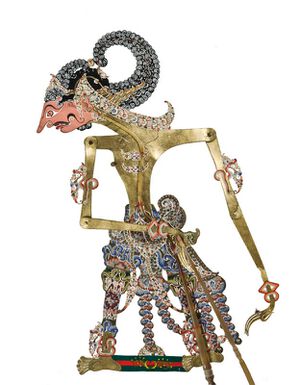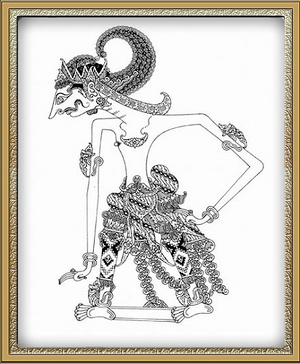Wratsangka - (Wayang Kulit)
| Title | Wratsangka - (Raden) - Mahabharata |
|---|---|
| Other names | Sanka |
| Size | 50 cm |
| Personal data | Arya Wratsangka (Sangka) was the youngest son of Prabu Matswapati/Durgandana, king of the Wirata country with his consort Dewi Ni Yutisnawati/Rekatawati, adopted daughter of Resi Palasara and Dewi Durgandini. Arya Wratsangka has three siblings, each named; Arya Seta, Arya Utara and Dewi Utari. Arya Wratsangka married Dewi Sindusari, daughter of Prabu Tasikraja, king of the Tasikretna state. He was given the wife because he was able to defeat the enemy of Prabu Tasikraja, a giant king from the country of Bulukapitu, named Prabu Prawata. |
| Appearance | Arya Wratsangka is a brave knight, clever, agile and skilled at using arrows. Raden Wratsangka has kedondong eyes, a complete nose and mouth, a mustache and beard, lizard-like hair, a kluwh flower-shaped face, a crescent moon necklace, a pontoh and a kroncong. Wearing royal cloth. |
| Collection | Private collection |
Wratsangka – (Raden) – Mahabharata
Arya Wratsangka married at the same time as his brother, Arya Utara who married Dewi Tirtawati, Dewi Sindusari's sister after they succeeded in killing Arya Girikusuma and his father Prabu Prawata from the Bulukapitu country.
Arya Wratsangka is a warrior who always upholds his sense of duty. When the Bharatayuda war broke out between the Pandawa and Kurawa families, Arya Wratsangka plunged into the battlefield as a Senapati Pandawa, accompanied Senapati Agung, Resi Seta.
After the death of Raden Utara, Wratsangka was appointed as the war commander. He was later killed by Bisma.
The deaths of the three brothers, Seta, Utara and Wratsangka, occurred in one day and deeply moved the entire country. To the point that the mothers of the three knights came to battlefield and cried over the bodies of her sons gathered together. The mother's grief was immeasurable, as she looked at the faces of her sons. But she was also magnanimous because the deaths of her sons were caused by devotion to the homeland in fighting for the truth.
During his life, he did not have any important roles in the epics.
Source: History of Wayang Purwa - Hardjowirogo - PN Balai Pustaka - 1982


